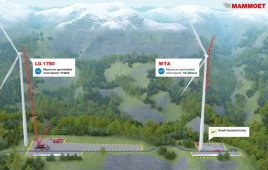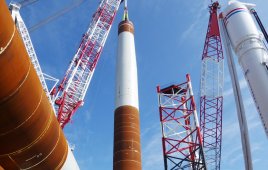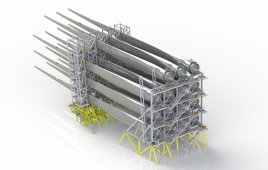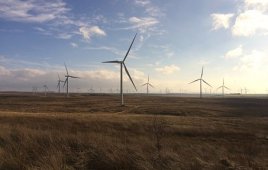Bryony Collins / Editor / Bloomberg New Energy Finance editor
This article first appeared in BNEF’s ‘New Energy Deals’ publication, available to clients on the web and on the Bloomberg Terminal.

Dong Energy said it is confident that financial investors will be prepared to buy equity stakes in the 480 MW of German offshore wind farms, which the company won the rights to build thanks to record-breaking zero-subsidy bids in an auction in April.
Dong Energy said it is confident that financial investors will be prepared to buy equity stakes in the 480 MW of German offshore wind farms, which the company won the rights to build thanks to record-breaking zero-subsidy bids in an auction in April.
Martin Neubert, chief strategy officer at the wind power division of the Danish company, told BNEF that the three offshore wind projects in the German North Sea would be suitable for Dong’s ‘farm-down’ approach, in which it sells equity stakes pre-construction to outside investors in order to free up its own capital for further projects.
Investors have previously shown they are willing to take on a certain degree of merchant price risk when committing capital to German renewable energy projects, “which typically only had a very short feed-in tariff period compared with the full lifetime of the asset,” he said in a telephone interview. And Dong Energy has also shown that asset rotation works with U.K. projects built using Renewables Obligation Certificates that “have a very significant merchant price element”, he added.
The farm-down model, otherwise known as asset rotation or build-sell-operate, involves utilities selling stakes in green power assets to institutional investors seeking long-term, stable yield. In the case of renewable energy, revenues for such projects have, until now, been underpinned by guaranteed subsidies.
By bidding to build two 240MW offshore wind projects with no subsidy on top of the wholesale power price, Dong Energy has demonstrated the vastly improved economics of the technology but has also increased the electricity price exposure for future investors. According to Neubert, the change is not representative of a “complete paradigm shift.”
Investors have shown they are comfortable with merchant price risk in certain situations, he said. Neubert also said that it would signify a “fundamental market failure” were power prices to differ substantially from what the company has forecast when the time comes to make a final investment decision on the recently-contracted German projects in 2021. Markedly low power prices would present a problem for the energy industry as a whole, not just offshore wind, Neubert said.
By 2024, when the three projects are scheduled to begin operation, Dong expects turbines of 13-15MW in size to be available – enabling it to increase power production and reduce installation time – while the option to add additional volume to the contracted wind farms in next year’s auction will also help to achieve cost reduction through scale. Neubert spoke about optimal project size and offshore wind development in the U.S. and Taiwan in the following interview with BNEF.
Q: How will the absence of a stable revenue stream from the zero- subsidy bids won by Dong Energy in Germany’s offshore wind auction
impact the company’s farm-down model?
For the rest of the article: https://goo.gl/5Yu4cC
Filed Under: Construction, Financing, News, Projects




